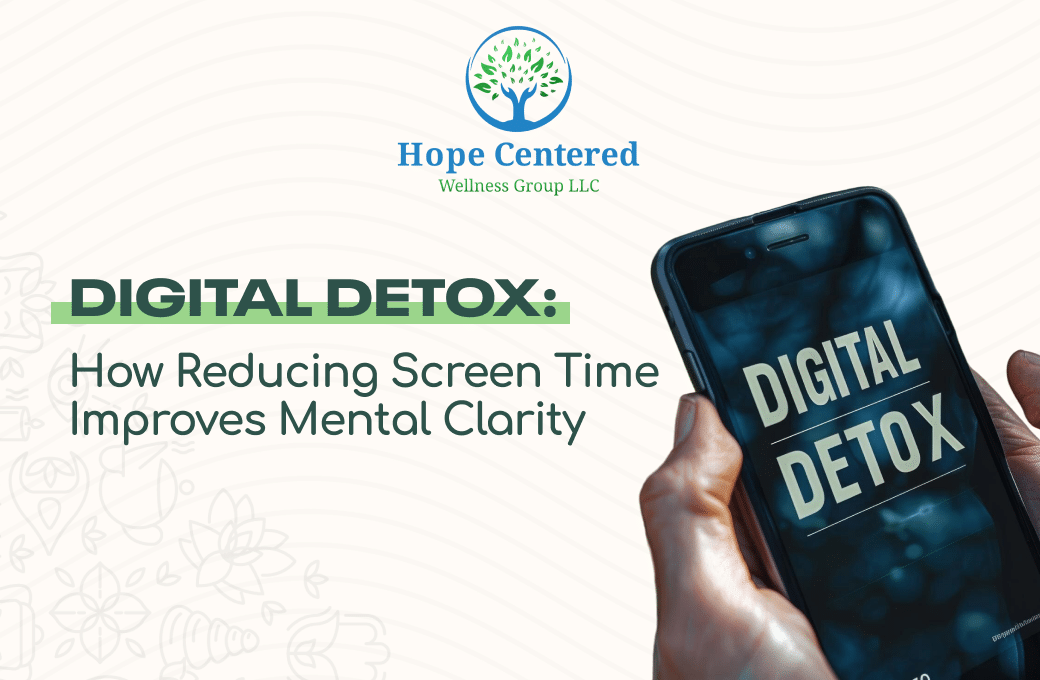Introduction
In an era where we are constantly connected, the need for a digital detox has never been greater. Excessive screen time can diminish your mental clarity, disrupt sleep, and increase stress. With the right habits and awareness, you can reclaim your focus, sharpen your thinking, and restore inner calm.
What Is a Digital Detox and Why It Matters for Mental Clarity
A digital detox means intentionally stepping back from screens—phones, computers, tablets—to reset how you use technology. It isn’t about rejecting tech entirely but creating healthier boundaries that protect your mind and emotional well-being.
The Hidden Effects of Too Much Screen Time on Mental Health
Multiple studies demonstrate that too much screen exposure is linked with mental and emotional issues:
- A study of adolescents in Bangladesh found a strong association between higher screen time and increased anxiety, especially when sleep is disrupted.
- In children aged 6–14 in Saudi Arabia and Bahrain, emotional and depressive symptoms correlated with over 7 hours of daily screen time. (PubMed)
- A randomized trial showed reducing smartphone screen time significantly improved mental health in young people. (BioMed Central)
These findings show that screen time doesn’t just affect productivity—it can undermine emotional health and clarity too.
How a Digital Detox Helps You Regain Focus and Emotional Balance
1. Enhances Attention and Focus
By reducing the constant distractions—notifications, pop-ups, alerts—your brain gets a chance to concentrate deeply. Tasks become easier to complete without the pull of multitasking.
2. Improves Sleep Quality
Screens emit blue light that suppresses melatonin production, delaying sleep. Cutting screen exposure, especially in the evening, leads to better rest. In turn, better sleep boosts clarity and mood.
3. Lowers Stress and Anxiety
Constant exposure to social media, news updates, or endless scrolling increases mental load. A detox helps reduce this load, decrease cortisol levels, and foster emotional calm.
4. Boosts Emotional Well-being
Reduced screen time gives space for non-digital interaction—reading, walking, hobbies—that enrich the soul and reconnects you with meaning.
Practical Digital Detox Strategies to Reduce Screen Time
- Establish “screen-free zones” in your home—like the bedroom or dining area.
- Use built-in tracking tools like Digital Wellbeing or Screen Time to monitor your usage.
- Set limits for notifications; mute non-essential alerts.
- Replace digital habits with mindful ones, such as journaling, meditation, or walks outdoors.
- Try having one “no-screen day” per week to fully unplug and reset.
Internal & External Links to Explore
- For strategies focused on stress and mindfulness, explore our Mindfulness Therapy page for tools and resources.
- To reach out for personalized support, visit Hope-Centered Wellness’ Contact page.
- External evidence: A study published in JAMA Network Open showed that reducing screen media use improved behavioral and mental health indicators in children and adolescents. (JAMA Network)
- Another study in BMC Medicine found that lowering smartphone usage led to mental health benefits, especially among young populations. (BioMed Central)
Why Hope-Centered Can Help
At Hope-Centered Wellness Group, we provide counseling and coaching designed to support digital well-being. Our approach blends practical tools, emotional support, and proven therapies to help you:
- Set boundaries that support mental clarity
- Rebuild healthy relationships with technology
- Regain control over your attention, mood, and focus
If you’re feeling mentally foggy or distracted, taking steps toward a digital detox now can change your life.

